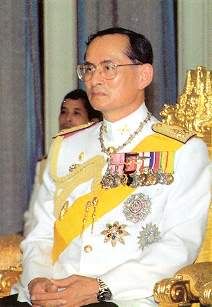Thailand: The Right Regal Touch - Timely and Effectively
Read here full article by John Aglionby "King halts Thailand's troubles" in The Guardan UK

King Bhumibol Adulyadej
The much revered King of Thailand had achieved what all his quarrelling subjects could not - a political compromise.
Months of turmoil and angry demonstrations have paralysed Thailand's parliament in a political soap opera of revolt and belligerence.
But yesterday there appeared to be a sudden light at the end of the tunnel after a dramatic intervention by King Bhumibol Adulyadej. The monarch - who is almost a deity to Thais - persuaded feuding politicians to bury some of their differences and sending the previously apathetic judiciary into a frenzy of activity.
The most telling consequence of the change in atmosphere is that King Bhumibol has demonstrated he remains probably the world's most powerful constitutional monarch, ruling over a nation where no one dares not comply with his wishes. This is in spite of the fact that he announced on his last birthday that it should no longer be considered illegal to challenge him.
Thaksin's critics argued that the premier's authority was illegitimate because he had widely abused his power for personal gain. Meanwhile the government continued to accuse the three main opposition parties of electoral chicanery because the opposition had boycotted an 2 April snap election. The move left Thaksin's Thai Rak Thai party as the sole candidate in most constituencies.
The opposition then took advantage of electoral laws stating that contestants in single-candidate seats must win 20 per cent of eligible votes to get elected and that all seats must be filled for parliament to meet. Thirty-eight seats stayed empty and after by-elections last weekend 14 remained vacant with little prospect of being filled. Thai Rak Thai had argued that the constitution should be ignored and parliament should meet anyway while the opposition wanted the election annulled and the king to appoint a prime minister to oversee constitutional reform.
Meanwhile, the judges who had the power to decide appeared frozen into inaction through fear.
Then King Bhumibol entered the fray, only the third time he had intervened in domestic politics in his 60-year reign.
In speeches to newly-appointed judges, the 78-year-old monarch described the state of the country as a 'mess', the April election as 'undemocratic' and calls for him to appoint a leader as overstepping his power. He instead ordered the judiciary - resolve the crisis or resign.
'You cannot administrate the country by messing up,' he said. 'You cannot think in haste and pass the buck to the King, which is worse than messing things up in other areas, because the King has no authority.'
The political chill lifted rapidly.
On Friday, acting on the regal advice, the presidents of the supreme, administrative and constitutional courts held their first ever joint meeting to seek a solution to the crisis.
Hours later the administrative court cancelled yesterday's by-elections.
The cancellation immediately prompted speculation that the 2 April election would be nullified.
Yesterday morning the head of the leading opposition Democrat party, Abhisit Vejjajiva, used his address at the party's conveniently timed annual general congress to end his party's election boycott and deliver an election manifesto he called a 'people's agenda for reform'.
For its part, Thai Rak Thai dropped its demand that parliament meet even if some seats were unfilled. And leaders of the People's Alliance for Democracy (PAD), the anti-Thaksin street movement which had organised months of protests, announced they would respect the king's wishes and abide by the courts' decisions.
Not one word criticising the king's action as undemocratic meddling by an unelected figurehead has been uttered.
PAD leader Sondhi Limthongkul, facing charges of lese majeste for mentioning the king at a protest rally, was also pleased by the intervention because 'Thaksin refuses to defuse the situation because he is using the mask of democracy to disguise himself. He's a tyrant.'
King Bhumibol did not mention Thaksin by name but he has on several occasions publicly told the thin-skinned prime minister to accept criticism.
Many people appreciate, however, that they cannot rely on the king forever, particularly since his successors will certainly not be as experienced as him and might not be as deeply revered.
'It's important to have a final arbiter,' said political analyst Dr Thitinan Pongsudhirak. 'But the king can only do so much. If the people don't get it, mired in their own complacency and bogged down in their own petty conflict then the country is headed for disaster.'



0 Comments:
Post a Comment
Go to Latest Posting